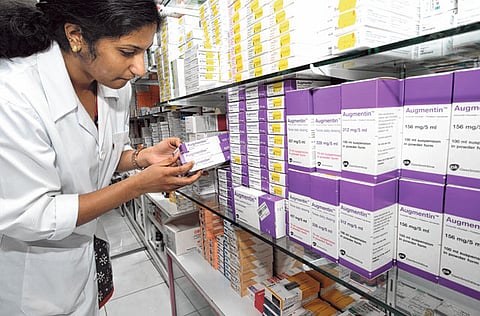Medics highlight risks of antibiotic misuse
Patients should keep an eye out for any unusual symptoms when taking antibiotics

Abu Dhabi: When prescribed a course of antibiotics, patients should keep an eye out for any unusual symptoms, even after taking just the first dose of medicine, medical professionals have urged.
Last summer, H.N., a 28-year-old mother in the capital, ended up with a severe burn-like rash all over her body after being prescribed a course of antibiotics along with other medicines.
"I had a fever and bodyache, and visited a private clinic. The doctor prescribed a number of medicines, which I took. After the first dose, my eyes began to itch and I had difficulty sleeping at night," she told Gulf News.
In the morning, H.N.'s eyes were swollen and she had a severe rash all over her body.
"A second doctor I visited stopped all my medicines but by the evening, I had 80 per cent burns over my body and could no longer open my eyes. I was hospitalised for a long while, and a year later, I am still unable to open my eyes properly."
Having lost her job and unable to care for her year-old daughter, H.N. appealed to doctors to warn their patients of the risks of medicines.
While symptoms like rashes on the body, swelling of the eyes, choking or congestion in the throat and severe diarrhoea are the most common reactions, certain patients can even end up with severe burns, they cautioned.
"There are several classes of antibiotics, and there is no real way of knowing how a patient will react to a particular type until he or she has taken it. This is why patients must keep a careful watch when they start taking antibiotics, or in fact any other medicine," Dr Yasser Sharif, section head of medication and medical products at the Health Authority — Abu Dhabi (Haad), told Gulf News.
Despite such risks, antibiotics continue to be among the drugs most commonly misused or abused, Dr Sharif said.
"For example, patients take antibiotics even when they have a cold brought about by a virus, which is unnecessary because antibiotics have no effect on viruses," he explained.
A study by the Haad Alliance for the Prudent Use of Antibiotics also revealed more than Dh180 million was spent on systemic antibiotics in 2010 within the emirate of Abu Dhabi alone.
Although these medicines are only available with doctors' prescriptions, the Haad official explained that patients often have pills from older prescriptions, and they take these.
"This is why we recommend patients throw away any remaining antibiotics," he added.
There are other risks with taking antibiotics too frequently. Patients may develop resistance to the healing properties of an antibiotic, and when they get sick again, doctors must prescribe a stronger drug for them. Women may also develop vaginitis (inflammation of the vagina), Dr Sharif said.
Dr Roshan John, internal medicine specialist at Lifeline Hospital, added that he was seeing more and more patients who have developed resistance to antibiotics due to misuse.
Hospitalisation
"The number of patients who visit me with this kind of resistance has almost doubled within a year's time. Not only does this call for a stronger medicine for the patient but, in many cases, the antibiotic has to be delivered intravenously, and this requires hospitalisation and increases treatment costs as well," he said.
Dr John added that many patients also do not reveal what medicines they have taken on their own.
"If a patient is taking some other medicine, it is imperative we know about it. Otherwise, the antibiotics and other drugs we prescribe can have a very bad reaction," he said.
Dr Sharif said Haad also has a programme that regularly educates medical staff on the correct use of antibiotics as well as other drugs.


